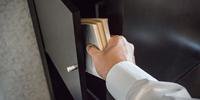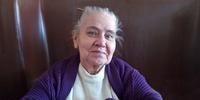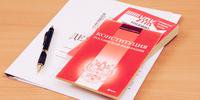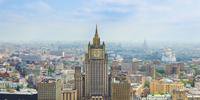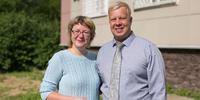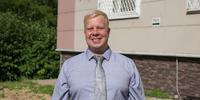Case of Yakku in Arkhangelsk
Filter
- #
The Investigative Committee of the Russian Federation for the Arkhangelsk Region and the Nenets Autonomous Okrug initiates a criminal case for faith under Articles 282.2 (1.1), 282.2 (2) against Yevgeny Yakku (born in 1980); according to the investigation, he participated in worship services, which is interpreted as participation and involvement in the activities of an "extremist organization" (with reference to the decision of the Supreme Court of the Russian Federation to liquidate all 396 registered organizations of Jehovah's Witnesses). The case is being investigated by an investigator for especially important cases, Lieutenant Colonel of Justice R. Shagarov.
- #
- #
The Lomonosov District Court of Arkhangelsk arrests the cars of the Yakku family in order to ensure the execution of a possible sentence, implying a fine in the amount of a 3-year salary or up to 700 thousand rubles. Only the judge and the prosecutor participate in the hearing. Neither Yevgeniy Yakku nor his lawyer is invited to the hearing.
- #
Eugene Yakku complains about unfair accusations to the European Court of Human Rights.
- #
- #
Another criminal case under Article 282.2 (2) of the Criminal Code of the Russian Federation was initiated against 78-year-old Kaleria Mamykina. According to investigators, the pensioner allegedly continued the illegal activities of the banned local religious organization of Jehovah's Witnesses in Arkhangelsk.
- #
In the criminal case, a commission of religious forensic examination was appointed.
- #
Evgeny Yakku's lawyer submits a petition to recognize the conclusion of this examination as inadmissible evidence and asks to appoint a re-examination at the FBI "RFTSSE under the Ministry of Justice of Russia". The application was denied.
- #
Investigator R. Shagarov initiates a new criminal case under Article 282.2 (1) of the Criminal Code of the Russian Federation against Yevgeniy Yakku - now he is charged with organizing the activities of an extremist organization.
- #
The lawyer will re-appeal against the investigator's decision to refuse to conduct a comprehensive religious examination. The complaint was dismissed.
- #
Investigator Roman Shagarov terminates the criminal case against Kaleria Mamykina, arguing that she "exercised her right to freedom of religion" under the Constitution of the Russian Federation. Receiving fellow believers in her home, Mamykina "had no intention of participating in the activities of a [banned] religious organization." Thus, the woman's actions do not constitute a crime under Part 2 of Article 282.2 of the Criminal Code of the Russian Federation.
- #
- #
The prosecutor approves the indictment in the case of Yakku and then transfers it to the Oktyabrsky Court of Arkhangelsk. Yevgeniy files a complaint with the prosecutor's office about disagreement with the charges. The first and second criminal cases initiated against the believer are combined into one proceeding.
- #
The believer expresses his disagreement with the charges to the Oktyabrsky Court of the city of Arkhangelsk. It is based on Article 28 of the Constitution of the Russian Federation, which states: "Everyone is guaranteed freedom of conscience, freedom of religion, including the right to profess, individually or in community with others, any religion or not to profess any." Yevgeny also draws attention to the fact that the decision of the Supreme Court of April 20, 2017 to ban religious organizations of Jehovah's Witnesses in Russia, on the basis of which the prosecutor bases his accusation, did not address the issue of the rights of individuals to practice the religion of Jehovah's Witnesses.
Yakku also recalls the repeated statements of the Government of the Russian Federation that the decision of the Supreme Court "does not assess the doctrine of Jehovah's Witnesses, does not contain a restriction or prohibition to practice the above teachings individually."
Yakku concludes: "The Supreme Court of the Russian Federation, as well as the Government of the Russian Federation, publicly declare that citizens in Russia have the right to continue to practice the religion of Jehovah's Witnesses. Therefore, it is not completely clear to me on what basis the investigating authorities and the prosecutor in the city of Arkhangelsk accuse me of extremism. The only explanation that I find is that the investigating authorities illegally freely interpret the decision of the Supreme Court of 20.04.2017.
- #
Yakku's case is referred to the Solombala District Court of competent jurisdiction. Yakku's lawyer intends to appeal this decision.
- #
An appeal hearing is underway to transfer the case from the Oktyabrsky District Court to the Solombalsky District Court of territorial jurisdiction.
Eugene Yakku declares that he refuses the services of a lawyer at this stage due to his financial situation. "Thanks to the persecution of the Investigative Committee, I was left without a job, all accounts were blocked, cars were arrested," the defendant explains. The court appoints a lawyer to participate in the hearing with the subsequent recovery of costs from the federal budget.
Judge Natalia Maksimova grants Yakku's request to include the decision of the Working Group on Arbitrary Detention of the UN Human Rights Council in the case file.
Eugene Yakku expresses the opinion that the judge of the Oktyabrsky Court redirects the case to another court, fearing to take responsibility for making a decision on a case of serious international importance.
The defendant's lawyer believes that "the decision of the Oktyabrsky District Court to change the territorial jurisdiction is illegal and unreasonable."
The appellate court decides to uphold the decision of the Oktyabrsky District Court to transfer the criminal case to the Solombalsky District Court.
- #
The first hearing in the case of Yakku in the Solombala District Court. Listeners are not allowed in the hall. The defense submits motions for publicity, for the termination of the criminal case and for a change in the measure of restraint. Judge Nikolay Bakov refuses to satisfy the petitions. A break is announced until September 28.
The indictment will be read out, after which the defendant will express his attitude to the charge.
- #
15 people come to the hearing in the Solombala District Court to support Yevgeniy Yakku.
The believer reads out his explanations of the charges against him. He notes that he has never been a member of the local religious organization in Arkhangelsk, the continuation of which he is accused of. In addition, the mentioned organization does not appear in the decision of the Supreme Court of the Russian Federation of 20.04.2017, to which the prosecutor refers, since it voluntarily ceased its activities even before this date.
Eugene Yakku comments on the repeated search of his home under the guise of an inspection, considering it illegal and emphasizing the judge's attention that nothing was seized from his apartment that day.
The charges in the criminal case include excerpts from printed publications of Jehovah's Witnesses concerning the origins of certain religious holidays. The defendant explains to Judge Nikolai Bakov that these quotes are taken from well-known books and encyclopedias. "I emphasize once again," says Yevgeny, "that the doctrine of Jehovah's Witnesses was not prohibited by the decision of the Supreme Court of 20.04.2017. Judging by what is attached to the written evidence and read out by the public prosecutor, it refers exclusively to the beliefs of Jehovah's Witnesses, and not in any way to the activities of the LRO. It turns out that I am being judged for believing in Jehovah God."
- #
At the regular hearing of the criminal case against Yevgeniy Yakku in the Solombala District Court, 8 people are present.
Yakku repeatedly emphasizes that he has never been a member of a local religious organization, so he cannot know the details of its activities. He also claims that he does not use literature recognized as extremist. He reminds the court that the teachings of Jehovah's Witnesses have not been and cannot be banned, and the choice of religion is a right guaranteed by the Constitution.
During the trial, Yevgeny notes that neither he nor his wife encouraged others to use banned religious literature, and the entire batch of Bibles seized at customs and later recognized as extremist never entered Russia.
- #
During the trial, the prosecution witness reports pressure from the investigator to fabricate testimony. At the next hearing, the investigator shall be summoned for questioning to clarify the circumstances.
- #
Four prosecution witnesses are questioned during the trial. The investigator denies that he exerted pressure on the witness during the interrogation. He confirms that he supervised the examination, according to which the believer allegedly gained access to a prohibited resource through third-party sites. At the request of the lawyer to demonstrate how this is possible, the investigator refuses. According to him, this procedure was carried out by specialists without his direct participation.
Yevgeniy Yakku's wife, Irina, is next to be interrogated. She notes that Jehovah's Witnesses do not refuse medical treatment or call for the overthrow of the constitutional order or the severing of family ties. When asked why they continued to meet after the liquidation of the LRO, Irina cites the example of graduates: even after school, they remain friends and sometimes get together. The witness notes that her husband did not organize official events, but helped to hold friendly meetings without forcing anyone to come to them. "Even God didn't drag anyone by the hand into Noah's ark," adds Irina.
- #
Two witnesses shall be questioned at the next hearing. They characterize Yevgeny Yakku extremely positively. About the defendant's family, one of them says: "They are always smiling, good-natured people. People with open hearts." Witnesses confirm that they have never heard from Yevgeniy calls for something illegal or for refusal of medical care. One of the witnesses comments on the prosecutor's questions about the refusal of believers from a specific medical manipulation - a blood transfusion as follows: "Here is a victim of a blood transfusion. In 1986, during an extensive operation, I received a blood transfusion, and I am still registered in the first city [hospital] in the infectious diseases [department]." Another witness, a medical professional with a higher education, talks about the dangers of blood transfusions, based on scientific research.
At the next meeting, it is planned to continue the interrogation of witnesses, including secret ones. The defendant petitions for its declassification. The interrogation is scheduled for February 10.
- #
The questioning of prosecution witnesses is ongoing.
The first to be interrogated in the secret room is the secret witness "Ivan Petrov".
The defendant requests the exclusion of his testimony, as it was taken in violation of the law, namely Part 5 of Article 278 and Part 9 of Article 166 of the Code of Criminal Procedure of the Russian Federation. According to these articles, the materials of the criminal case must be accompanied by an envelope with the true identity of the secret witness and the judge must open it before interrogation. But the envelope is not in the case file, there is no data about it in the indictment, the defense did not see it, and the judge did not open it in front of everyone. At the hearing, it turns out that the envelope has been found, and the secret witness is interrogated.
"Ivan Petrov" gives a general description of the activities of Jehovah's Witnesses and talks about their beliefs, as well as how they conducted divine services. The defense draws the court's attention to the fact that "Ivan Petrov" is being interrogated not as a specialist, but as a witness, and cannot tell the court anything specific about the case.
The second to be interviewed is FSB officer Denisov. He informs the court that he does not know the defendant personally, but saw his name in documents seized during a search of another believer. The lawyer is trying to find out why the witness decided that Yakku is the organizer of the group, because in the documents opposite his name only "No. 3" is written and no explanation is given.
The last to be interrogated as a witness is the Orthodox priest Theodosius Nesterov. He has never met the defendant, but expresses the opinion that in the magazines published by Jehovah's Witnesses "there is clearly a motive for inciting intolerance ... especially to Orthodoxy. Although it is not on all pages and encrypted. You have to read between the lines."
The next meeting will be held on February 26. It is planned to interrogate the linguist Sibirtseva.
- #
The believer's family receives a response from the Ministry of Foreign Affairs of the Russian Federation to a letter in which the believer's wife, Irina, informed the minister about the criminal prosecution of their family and about the contradiction of what was happening with international law. The response states, among other things: "Members of a liquidated organization can independently practice a religious cult, including as part of religious groups that do not require registration."
- #
- #
Prosecution witness Yulia Sibirtseva, religious scholar, is being questioned. She submits to the court the results of a comprehensive examination conducted by her according to the methodology of the Ministry of Science and Higher Education of the Russian Federation. In her examination, Sibirtseva gives an overview of the history and doctrine of Jehovah's Witnesses, and also draws attention to the fact that the followers of the association do not smoke, do not abuse alcohol, and do not use drugs. She notes that Jehovah's Witnesses refrain from participating in political movements, parties, and celebrations of state symbols, and this is their legal right. She also confirms that the Supreme Court did not ban the faith of Jehovah's Witnesses, and their worship services consist of reading and discussing the Bible.
- #
The conclusion and testimony of religious scholar Sergey Ivanenko are attached to the case file.
The decision of the Supreme Court is read out, from which it is clear that the LRO "Central, Arkhangelsk" is not on the list of liquidated organizations, has never been recognized as extremist by any court. Moreover, this organization was disbanded on the initiative of believers. Nevertheless, Eugene Yakku is accused of organizing its activities.
- #
In court, the films "How to help a patient without violating his rights" and "Faithful in the test. Jehovah's Witnesses in the Soviet Union". After the screening, the defendant emphasizes that Jehovah's Witnesses are civilians who do not take up arms in any country in the world, and not a single negative comment about the authorities was heard from the people giving interviews.
- #
It becomes known that Kaleria Mamykina died from complications caused by COVID-19. She did not wait for the results of her rehabilitation, which would have included an official apology from the prosecutor, compensation for material and moral damage, since investigator Roman Shagarov terminated the criminal case against the believer.
- #
The prosecutor asks for 7.5 years in prison for Yevgeny, 2.5 years of restriction of freedom, and also asks to transfer both arrested cars and other seized equipment to the state, and destroy everything else, including the seized Bibles. The believer will deliver his last word on July 16. On the same day, the court may announce the verdict.
- #
To be published later.
The last word of the defendant Yevgeniy Yakku in Arkhangelsk - #
- #
- #
The Third Court of Cassation in St. Petersburg leaves the sentence to Yevgeny Yakku unchanged - a fine of 780 thousand rubles.


